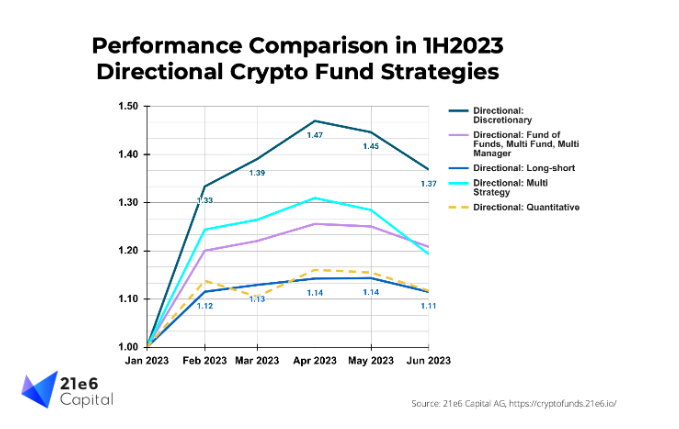According to 21e6 Capital’s data, 13% of crypto hedge funds have been closed in 2023 so far, and the pace of fund establishment has slowed down. Bitcoin has gained about 75% against the dollar since the beginning of the year. This trend contradicts the past performance of such funds, which historically perform well when the value of crypto assets increases.
Funds Can’t Keep Up with Bitcoin Gains
According to data analysis by 21e6 Capital’s crypto funds, hedge funds struggled to keep up with the increase in Bitcoin prices. And in different fund strategies, dollar returns in 2023 lagged behind Bitcoin gains.
A Swiss firm found in its analysis of the data that hedge funds performed poorly, especially compared to Bitcoin.
Hedge funds implement strategies based on expected market movements. They rely more on futures markets compared to non-hedge funds and tend to bet on short-term price fluctuations. However, when applied in the crypto market, hedge strategies can fail when long-term trends are disrupted.
Concerns with Artificial Intelligence
Among all the investment strategies followed by hedge funds, the quantitative directional approach was proven to be the least effective in 2023. This strategy is based on statistical decision-making and tends to leverage trading algorithms.

As mentioned in the 21e6 Capital report, these data-driven approaches have caused headaches for hedge funds in a year characterized by high market volatility. In other words, even though crypto prices have risen, they have not followed previously observed price movements.
Another challenge facing algorithmic trading tactics is the increasing proliferation of content generated by artificial intelligence on the internet. Quant funds adjust their data collection methods to maintain the accuracy and effectiveness of their algorithms. However, in an environment where misinformation generated by AI is becoming increasingly prevalent, algorithms are hindered from functioning properly.
In fact, it is not only trading algorithms that are threatened by the increasing prevalence of AI-generated content. Studies have shown that algorithms are negatively affected when input data for different machine learning models is distorted with artificially generated materials.


 Türkçe
Türkçe Español
Español












You Comments